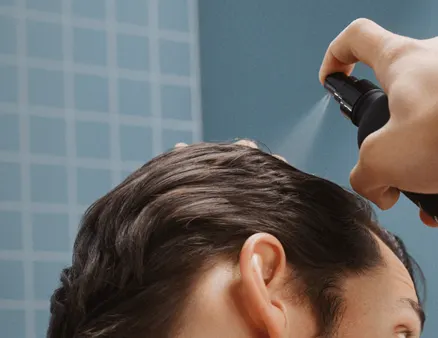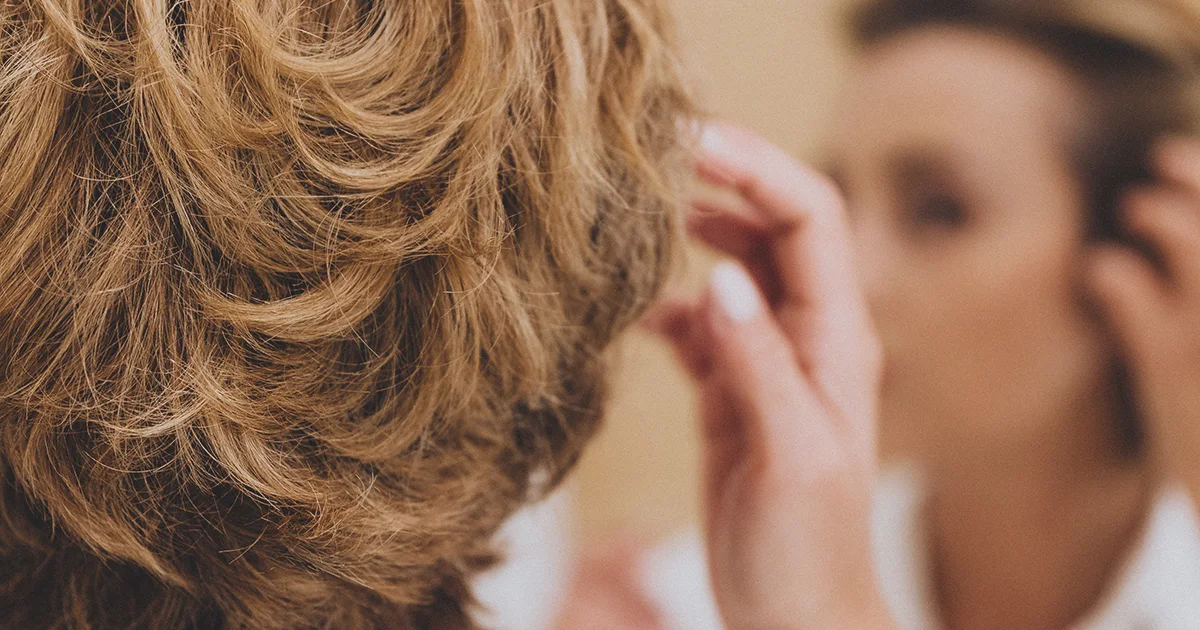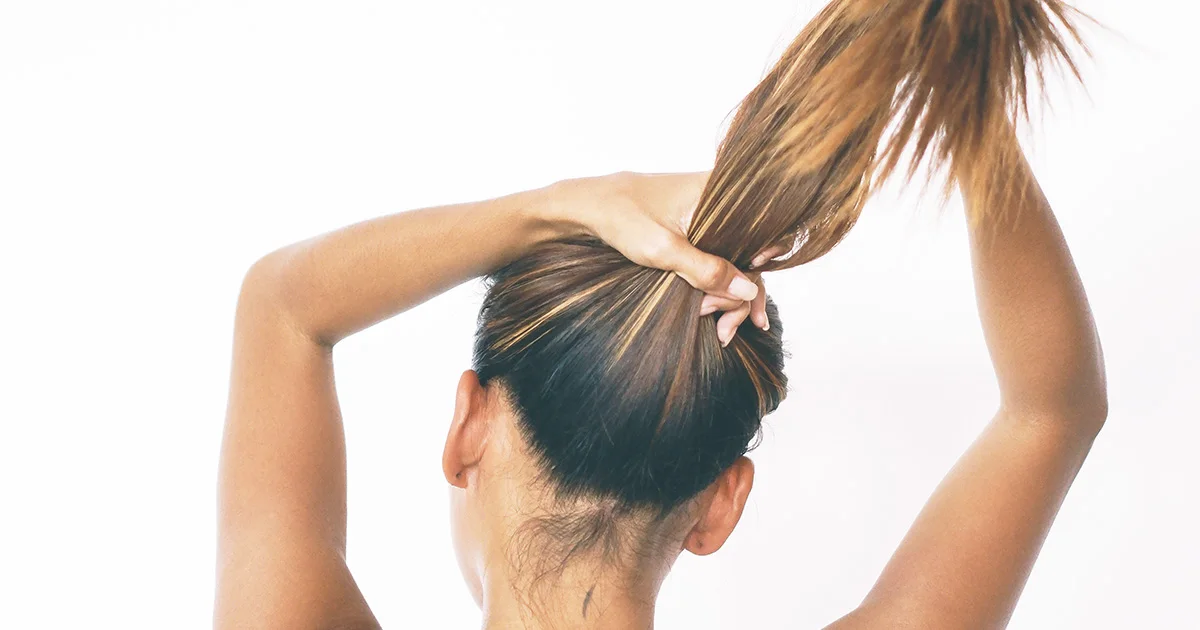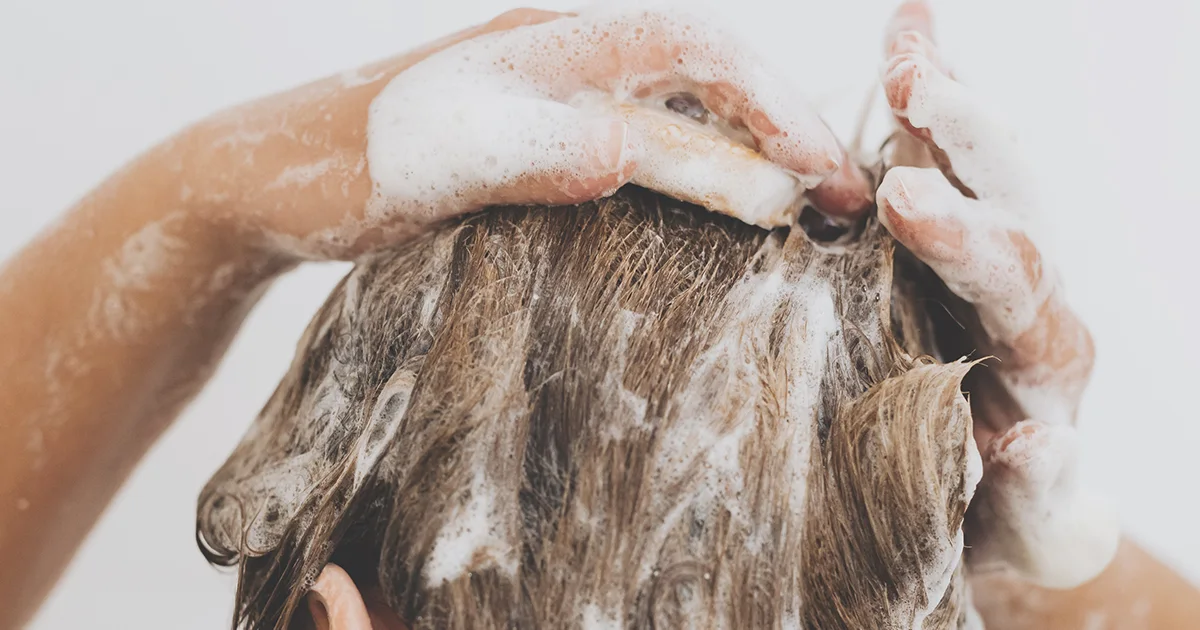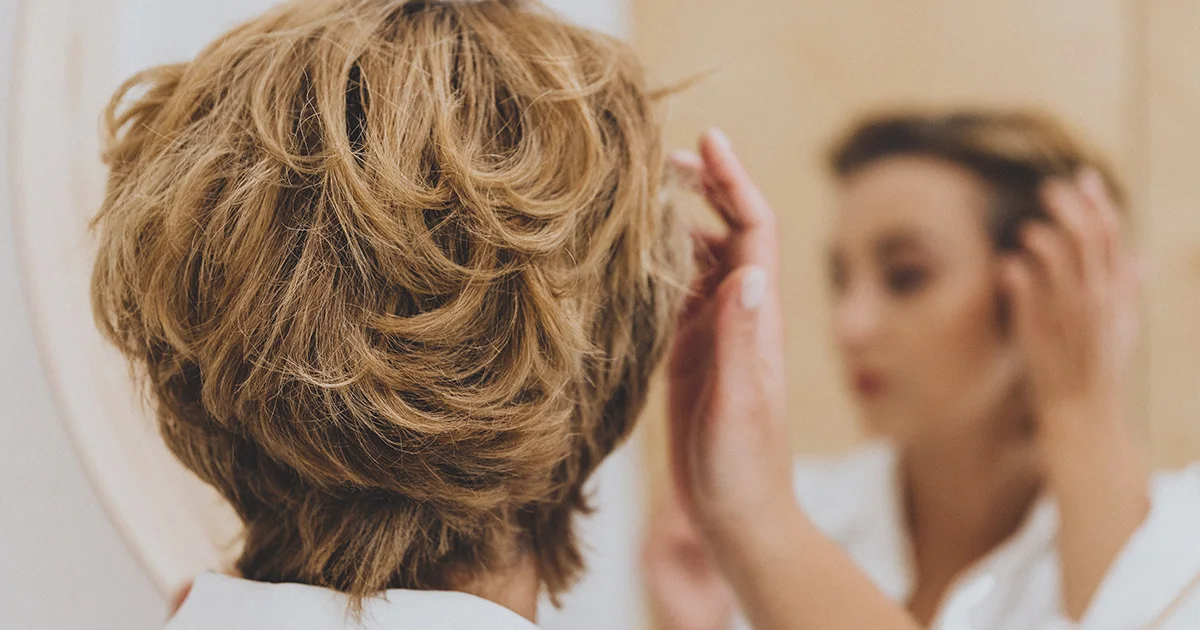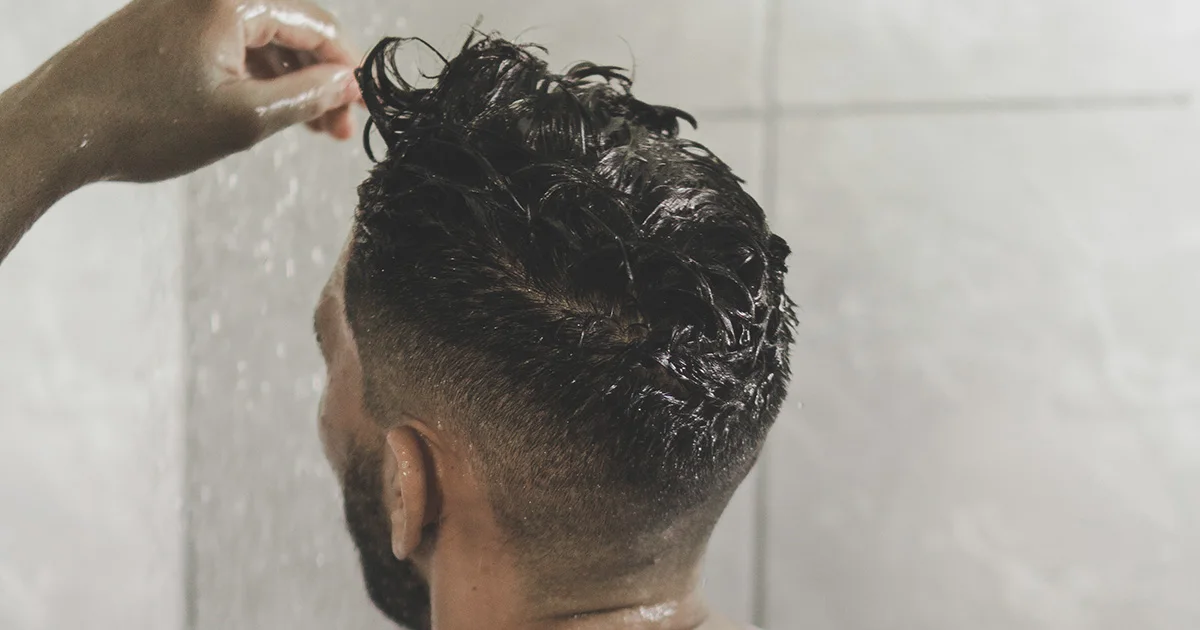Here's what we'll cover
Here's what we'll cover
Here's what we'll cover
If you’ve noticed more hair shedding since you switched to a vegetarian or vegan diet, you may wonder if your plant-based diet is causing it. And whether you’ve gone plant-based for ethical, environmental, or health reasons, it may be a choice you’re planning to stick with, making the hair shedding even more distressing. Is the lack of meat in your diet causing your hair loss?
While your menu change could be involved in your hair thinning, it’s not for the reason you might think, and you probably don’t have to start eating meat again if you don’t want to. Let’s look at how a vegetarian diet may be linked to hair loss.
Can not eating meat cause hair loss?
A vegetarian or vegan diet can lead to hair loss, but it’s not just about whether or not you eat steak. The vitamin and nutrient deficiencies that may occur in a vegetarian diet cause hair loss, not simply a lack of meat.
Switching to a vegetarian diet requires people to cut out whole food groups. But these foods contain specific nutrients, like protein. People new to a vegetarian diet may not know how to get enough protein from non-meat sources. If you don’t fill in these dietary gaps, it may result in excessive hair shedding and temporary hair loss or telogen effluvium (Hughes, 2021; Garg, 2019).
And protein isn’t the only nutrient that may fall short. It can be harder to get specific vitamins and minerals on a vegetarian diet, like vitamin B12, vitamin D, and selenium. But harder doesn’t mean impossible. There are ways to make sure you’re consuming enough nutrients on a vegetarian or vegan diet.
Nutritional deficiencies, vegetarian diets, and hair health
Not all vegetarians and vegans develop nutritional deficiencies. Let’s look at some strategies for getting enough vitamins and minerals for hair health while you’re avoiding meat.
Vitamin deficiencies
Several vitamin deficiencies are linked to hair loss:
Vitamin A: Low levels of vitamin A have been associated with telogen effluvium (Ruiz-Tagle, 2018). Vitamin A is found in beef liver, fish oil, milk, and eggs. Vegetarians and vegans can get enough Vitamin A by eating yellow or orange fruits and vegetables like carrots, pumpkin, butternut squash, and bell peppers. It is also found in sweet potatoes and leafy greens like kale and spinach.
Vitamin D: Studies also found a connection between low vitamin D levels and several types of hair loss, including an immune system disease that causes patchy hair loss called alopecia areata, male and female pattern baldness (androgenetic alopecia), and telogen effluvium (Almohanna, 2019). Foods high in vitamin D include dairy and eggs, so lacto-ovo vegetarians may be consuming enough. Vegans may have a harder time finding food sources for this nutrient, although some soy milks, almond milks, and juices are fortified with vitamin D. It’s also found in some mushrooms (Weikert, 2020).
Vitamin B12: Some studies have found an association between hair loss and low levels of vitamin B12, though other studies are inconclusive (Poonia, 2018; Thompson, 2017). Vitamin B12 is high in foods like seaweed, sauerkraut, shiitake mushrooms, and an edible algae called spirulina (Rizzo, 2016).
Mineral deficiencies
There are also several minerals that may be lacking in a vegetarian’s or vegan’s diet.
Iron deficiency, for example, can lead to hair loss, including both telogen effluvium and alopecia areata (Ruiz-Tagle, 2018). There’s plenty of iron in animal products and plants, but the iron in some plant products is harder for the body to absorb, so vegetarians and vegans may be at risk for lower iron levels.
Studies suggest that vegetarians typically have lower iron than people who consume meat (Pawlak, 2018). It’s even lower in vegetarians who menstruate (Slywitch, 2021). One way to boost your iron intake is by eating iron-containing foods like beans, lentils, nuts, leafy greens, and potato skin, as well as iron-fortified foods like cereal (Pawlak, 2018).
Zinc is another mineral that people on plant-based diets may be deficient in. Zinc deficiency may contribute to alopecia areata and telogen effluvium (Kil, 2013). Vegetarians and vegans usually have lower zinc levels than their omnivorous counterparts (Foster, 2013). You can include more zinc in your diet by eating foods like beans, seeds, nuts, and whole grains.
Protein deficiency
People who eat a low-protein diet are more likely to have hair loss, including telogen effluvium, androgenetic alopecia, and alopecia areata. Some studies found that vegetarians and vegans have significantly lower levels of dietary protein than omnivores (Garg, 2019).
Dietary protein is found in products like meat, fish, and eggs. But there are plenty of plant-based sources of protein, too. Beans, nuts, seeds, lentils, and soybeans are good plant-based protein sources.
Vegetarian hair loss: will it grow back?
If a lack of nutrients caused your hair loss, there’s good news—it can grow back if you fix the nutrient deficiencies.
It’s important to talk to a healthcare professional and get testing done when necessary to pinpoint any nutrient deficiencies that may be contributing to hair shedding. Your provider can help you decide how to adjust your diet. In some cases, dietary sources aren’t enough to correct the deficiency, so supplements may also be used (Poonia, 2018).
If you know the root of your hair loss is nutritional, but you still want to see quicker results, other strategies may encourage hair growth.
One small study found that low-level laser therapy (LLLT) helped regrow hair in female pattern hair loss or telogen effluvium with no side effects (Amer, 2021). And other small studies have found promising initial results for certain oils for hair loss, although there’s limited evidence (Ibrahim, 2021).
Preventing hair loss on a plant-based diet
A good way to prevent hair loss on a plant-based diet is to make sure you’re eating enough nutrients. Eat a wide variety of foods that contain different vitamins and minerals to help prevent nutritional deficiencies.
It may be worth using an online food diary tool to check your average calories, protein intake, and the types of vitamins and minerals you’re getting from the foods you eat. You don’t need to use it daily, but entering your food a couple of times a week can help estimate the nutrients in your diet.
If you’re looking to fill specific gaps in your diet through food, you can seek out:
Egg yolks, cheese, and mushrooms for dietary vitamin D
Whole grains and legumes (like lentils and chickpeas) for protein (LaPelusa, 2021)
Legumes, seeds, and dairy products for dietary zinc
Fortified foods (like breakfast cereal) and leafy greens for iron (NIH, 2021)
If you’re unsure that you’re meeting your nutritional needs, talk to your healthcare provider about your levels of vitamins and minerals before incorporating supplements. Only the nutrients you’re missing can fix a deficiency, so it’s wise to get your blood levels tested so you can supplement strategically. A registered dietitian may also help you build a meal plan that includes the micronutrients and macronutrients you need for healthy hair.
DISCLAIMER
If you have any medical questions or concerns, please talk to your healthcare provider. The articles on Health Guide are underpinned by peer-reviewed research and information drawn from medical societies and governmental agencies. However, they are not a substitute for professional medical advice, diagnosis, or treatment.
References
Almohanna, H. M., Ahmed, A. A., Tsatalis, J. P., et al. (2019). The role of vitamins and minerals in hair loss: A Review. Dermatology and Therapy , 9 (1), 51–70. doi:10.1007/s13555-018-0278-6. Retrieved from https://link.springer.com/article/10.1007/s13555-018-0278-6
Amer, M., Nassar, A., Attallah, H., et al. (2021). Results of low‐level laser therapy in the treatment of hair growth: An Egyptian experience. Dermatologic Therapy , 34 (3), e14940. doi:10.1111/dth.14940. Retrieved from https://onlinelibrary.wiley.com/doi/abs/10.1111/dth.14940
Foster, M., Chu, A., Petocz, P., et al. (2013). Effect of vegetarian diets on zinc status: A systematic review and meta-analysis of studies in humans. Journal of the Science of Food and Agriculture , 93 (10), 2362–2371.doi:10.1002/jsfa.6179. Retrieved from https://pubmed.ncbi.nlm.nih.gov/23595983/
Garg, S. & Sangwan, A. (2019). Dietary Protein Deficit and Deregulated Autophagy: A New Clinico-diagnostic Perspective in Pathogenesis of Early Aging, Skin, and Hair Disorders. Indian Dermatology Online Journal , 10 (2), 115–124. doi:/10.4103/idoj.IDOJ_123_18. Retrieved from https://www.ncbi.nlm.nih.gov/pmc/articles/PMC6434747/
Hughes, E.C. & Saleh, D. (2021). Telogen effluvium. StatPearls . Retrieved from https://www.ncbi.nlm.nih.gov/books/NBK430848/
Ibrahim, I. M., Hasan, M. S., Elsabaa, K. I., et al. (2021). Pumpkin seed oil vs. minoxidil 5% topical foam for the treatment of female pattern hair loss: A randomized comparative trial. Journal of Cosmetic Dermatology, 20 (9), 2867–2873. doi:10.1111/jocd.13976. Retrieved from https://pubmed.ncbi.nlm.nih.gov/33544448/
Kil, M. S., Kim, C. W., & Kim, S. S. (2013). Analysis of serum zinc and copper concentrations in hair loss. Annals of Dermatology , 25 (4), 405–409. doi:10.5021/ad.2013.25.4.405. Retrieved from https://synapse.koreamed.org/articles/1045713
LaPelusa, A. & Kaushik, R. (2021). Physiology, Proteins. StatPearls . Retrieved Apr. 5, 2022 from https://www.ncbi.nlm.nih.gov/books/NBK555990/
National Institutes of Health (NIH). (2021). Office of dietary supplements - iron . Retrieved from https://ods.od.nih.gov/factsheets/Iron-HealthProfessional/#h3
Pawlak, R., Berger, J., & Hines, I. (2016). Iron Status of Vegetarian Adults: A Review of Literature. American Journal of Lifestyle Medicine, 12 (6), 486–498. doi:10.1177/1559827616682933. Retrieved from https://www.ncbi.nlm.nih.gov/pmc/articles/PMC6367879/
Poonia, K., Thami, G. P., Bhalla, M., et al. (2018). Nonscarring diffuse hair loss in women: A clinico‐etiological study from Tertiary Care Center in north-west India. Journal of Cosmetic Dermatology , 18 (1), 401–407. doi:10.1111/jocd.12559. Retrieved from https://onlinelibrary.wiley.com/doi/abs/10.1111/jocd.12559
Rizzo, G., Laganà, A. S., Rapisarda, A. M., et al. (2016). Vitamin B12 among Vegetarians: Status, Assessment and Supplementation. Nutrients , 8(12), 767. doi:10.3390/nu8120767. Retrieved from https://www.ncbi.nlm.nih.gov/pmc/articles/PMC5188422/
Ruiz-Tagle, S. A., Figueira, M. M., Vial, V., et al. (2018). Micronutrients in hair loss. Our Dermatology Online , 9 (3), 320–328. doi:10.7241/ourd.20183.25. Retrieved from http://www.odermatol.com/odermatology/20183/25.Micronutrients-Ruiz-TagleSA.pdf
Slywitch, E., Savalli, C., Duarte, A. C., et al. (2021). Iron deficiency in vegetarian and omnivorous individuals: Analysis of 1340 individuals. Nutrients , 13 (9), 2964. doi:10.3390/nu13092964. Retrieved from https://www.mdpi.com/2072-6643/13/9/2964
Thompson, J. M., Mirza, M. A., Park, M. K., et al. (2017). The Role of Micronutrients in Alopecia Areata: A Review. American Journal of Clinical Dermatology, 18 (5), 663–679. doi:10.1007/s40257-017-0285-x. Retrieved from https://www.ncbi.nlm.nih.gov/pmc/articles/PMC5685931/
Weikert, C., Trefflich, I., Menzel, J., et al. (2020). Vitamin and Mineral Status in a Vegan Diet. Deutsches Arzteblatt International , 117 (35-36), 575–582. doi:10.3238/arztebl.2020.0575. Retrieved from https://www.ncbi.nlm.nih.gov/pmc/articles/PMC7779846/
